An enthusiastic Rocky fan, I was curious how the classic films on boxing would measure up. The Set-Up sounded intriguing because it was about the underworld attached to the sport, and shockingly, was based on a poem.
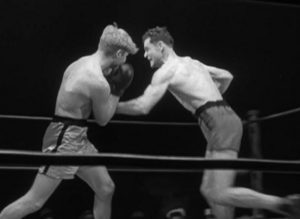
Let’s sit here and think about that for moment. A poem. Say it to yourself. Boxing. Poem. Can you put the two together? I sure couldn’t. But once I viewed the film, I did see a kind of poetry in it, and thought I’d say a few words about why this film is so moving and—yes, poetic. The Set-Up is about weighing choices, each of which shapes the film. The fact that the movie plays in the exact running time of the prep for and fight itself emphasizes the crucial timing of each decision…
Should a Manager Tell His Boxer He’s Fixed a Fight?
Manager Tiny (George Tobias) believes boxer Stoker Thompson will blow his match, satisfying mobster Little Boy (Alan Baxter), who has paid Tiny to fix the fight between Stoker and his favorite, Tiger Nelson (Hal Baylor). After all, Stoker is past his prime, and hasn’t been on a winning streak in quite some time.
If Tiny informs Stoker (Robert Ryan) about the fix, he will lose some of his cut. On the other hand, if Stoker doesn’t perform as expected, Tiny is in trouble with a mobster. Certain of his boxer’s ineptitude, Tiny considers neither the justice of his action, nor the danger it poses to Stoker. Only when his boxer shows spirit during the fight does Tiny begin to sweat—for himself.
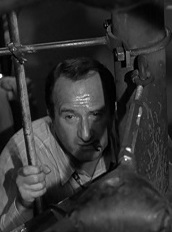
Should An Aging Boxer Give Up The Sport To Please His Wife?
Stoker’s wife, Julie (Audrey Totter), proclaims her resolution to stop attending her husband’s fights. She wants him to quit. Stoker tries to convince her he’s almost done with the sport, but urges her to wait longer, until he can make a greater success. At the start of the movie, he keeps looking to her window and the chair he’s reserved for her at the fight; she wanders around the city trying to decide whether to go.
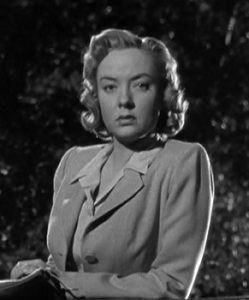
Clearly, Julie hates watching her husband get hurt, and worries about his survival. His love for her is painful to watch, as is hers for him. The problem is, all ambitions notwithstanding, Stoker also loves to fight. He enjoys the company of his fellow boxers, who thrive on hope, and rejuvenate his (comparatively) aging body and more resigned disposition with their energy and dreams.
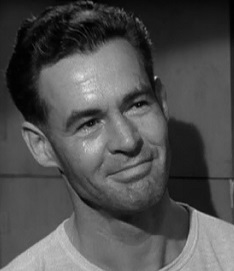
Julie has put up with a lot to support him in this profession. How long should he ask it of her? Will she leave him if he doesn’t let it go?
How Long Should a Fighter Wait Before Abandoning that One Chance to Make It Big?
In the locker room, Stoker acts as a kind of patriarch to his peers, easing their nerves and encouraging their bravado. When a first-time boxer vomits before his first round, a trainer asks Stoker to admit it happens to everyone.
Yes, Stoker agrees aloud, recalling his own first bout, when he did the same: Trenton, NJ, 20 years before. Stoker’s face is poignant at the memory, back when he was as jubilant as the young men around him.
Among the many wonderful moments in the locker room, the best is perhaps the encounter between Gunboat and Stoker. Both aging fighters, both still trying to maintain ambition. Gunboat is inspired by a former middleweight champion who was beat 21 times before winning, a statistic he repeats to all who will listen, hoping his own record will soon resemble it.
“Can’t you see me, Stoke,” says Gunboat. “First I win the title, and then the exhibition tour, that’s where the easy dough is. I’ll be in the movie, Stokes, with a line of dames waiting for me a block long…”
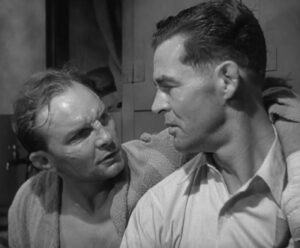
When Gunboat returns from his fight unconscious, the camera pans over each fighter and trainer in turn, the fear and pain in all of their faces perfectly capturing the guts it takes to move from this moment, as several must do, to their own matches. And, of course, it presents Stoker with the inevitable question: Has he waited too long to quit?
What Spells the Difference Between Enjoying a Dangerous Sport, and Craving the Carnage?
The movie focuses in on just a few spectators the whole film, letting us see the fight between Stoker and Nelson through their often disturbing reactions. There’s the woman in the crowd who claims to hate matches, but reacts with glee when the fighting is most brutal, and grumbles when it’s not….
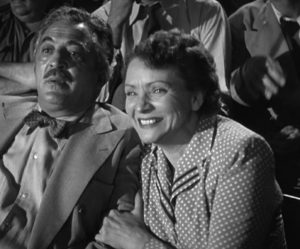
There’s the blind man relying on his friend for the play-by-play. “Nelson (Hal Baylor) opened up his left eye. He’s bleeding!” says the friend.
“Good,” his companion answers, and later yells at Nelson for not going for the eye again.
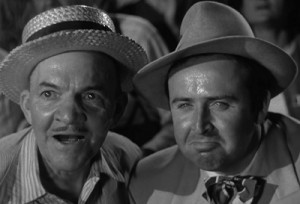
Then there’s the man who eats everything in the place, his appetite undisturbed by the blood, pain, or cries around him.
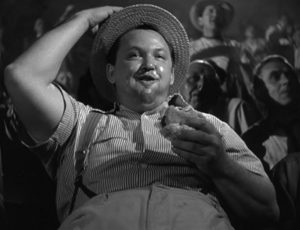
No wonder Julie doesn’t want to come. No wonder Stoker flinches before his fight at a spectator’s cries: “Kill ’im!”
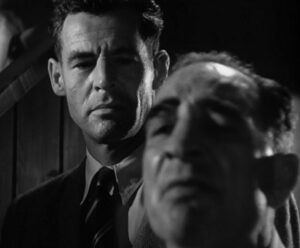
What Should a Man Do When He Discovers Betrayal, But Payback Could Be Fatal?
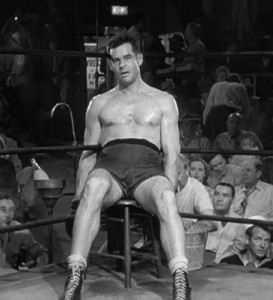
Stoker begins to suspect foul play when his manager keeps trying to convince him to ease up once he begins to win. The bout itself is riveting, moving from the match to those few members of the crowd we’re tracking.
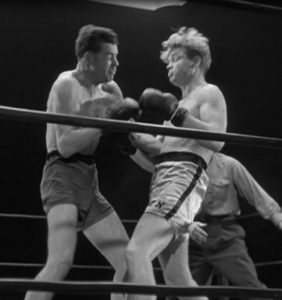
Ryan boxed in college, which explains why his moves are so convincing onscreen, unlike those of many actors in boxing films since. The confusion, anger, betrayal, and uncertainty of how to handle this fix play on this talented actor’s face. Given his pride, his conflict over Julie, and his disillusionment, we aren’t sure just what Stoker will do….
How Faithful Should Filmmakers Be to the Source Material?
The Set-Up has been criticized for changing the race of the poem’s hero from black to white, and among the harshest detractors were the poem’s author, Joseph Moncure March. It’s easy to dismiss the director’s claim that this change was because RKO didn’t have an African-American star then. The date alone (1949) suggests less elevated motives, and the black fighter in the movie, Luther, is played by James Edwards, who starred in the award-winning Home of the Brave that very same year.
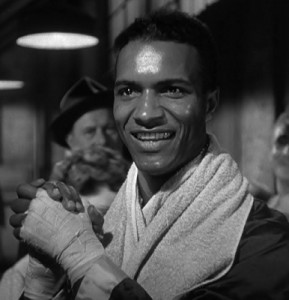
Luther is portrayed sympathetically, which suggests the same could have happened with a black leading man, and the kind of treatment Tiny doles out to his boxer would have darkened and deepened the meaning of the movie had they not shared the same race (not to mention more faithfully reflecting the boxing world at the time).
However, the poem’s author, Joseph Moncure March, according to scholar Jefferson Hunter, “attacks an injustice without fully understanding his own involvement in it” and “is more a denizen of his time and place than he knows.” That is, March referred to his hero as a “jungle jinx” and saddled him with bigamy and a prison record. Therefore, some changes needed to be made to the story, and given its audience’s likely prejudices, perhaps some might even have been a good idea. But what a film it would have been with a morally questionable fighter, and an exploration of race politics in the ring….

Don’t tell anyone, but I’ve always had a bit of a soft spot for Rocky – I love an underdog tale! I watched The Set-Up quite a while ago, so the specifics are a bit sketchy, but I remember the realism and the grittiness. I didn’t know the lead had been changed though – I’ll have to give it a re-watch with that in mind!
Well, I guess we can’t expect a film to follow its poem origins too closely:) You should never be ashamed of loving Rocky. Sure, Rocky IV is cheesy and wrong–and 5 worse. But the first one is great, and honestly, I love even the cheesy ones. My toddler nephew has multiple Rocky t-shirts from a family friend–that’s how well known my sister’s admiration is. My sister who usually hates sports and has never watched boxing outside of the films. There’s just something about those movies….
Love all the Rocky’s . You need to see Body And Soul, City For Conquest, They Made Me A Criminal and The Life Of Jimmy Dolan.
Hi John. They’re the best, aren’t they? I get inspired and happy just thinking of them:) I have Body and Soul home right now, I think based on your rec. Going to watch it soon. The others sound intriguing too. Thanks! Leah
I love this film, and am just about as heartbroken as Audrey Totter to see Robert Ryan take such a beating. I love him madly!
And John Garfield in Body and Soul. Oh my God.
Ryan, Garfield… Is it hot in here or is it just… them?
I’ve always found Garfield ridiculously attractive, but it took this film for me to get just how attractive Ryan was. Hard to believe I missed it before! Leah
The poem is back in print with all-new illustrations by Erik Kriek. https://www.koreropress.com/the-set-up/
Thanks amazing! Thank you for letting me know.